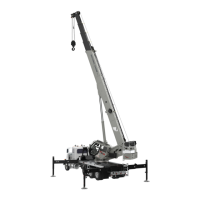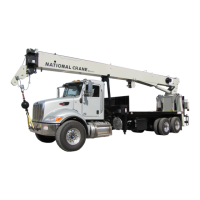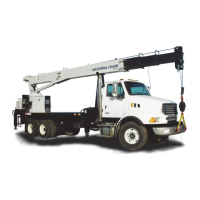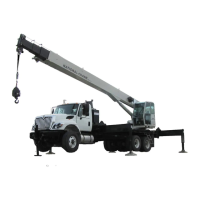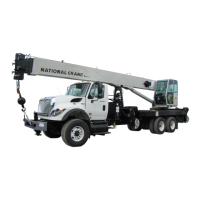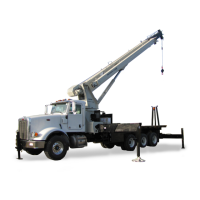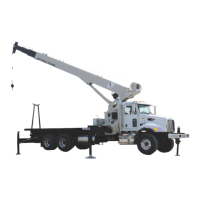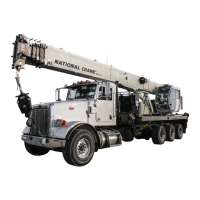Do you have a question about the Manitowoc NTC55 and is the answer not in the manual?
General information about the operator manual and crane operation.
Describes the parts of the National Crane and their nomenclature.
Identifies hazards that will result in death or serious injury if ignored.
Identifies hazards that may result in death or serious injury if ignored.
Alerts to hazardous operating practices and maintenance procedures.
Guidance for crane operators on manual and safety video.
Information on accessories that assist crane operation.
Ensures crane is on firm surface and within capacity.
Represents maximum allowable loads based on tipping or structural limits.
Inspection of work site for ground conditions and potential hazards.
Principles for operating in windy conditions and determining safe operation.
Precautions for operating near electrical power lines and sources.
Information on controls and operating procedures.
Controls used in conjunction with the crane.
Procedures for operating outriggers from various locations.
Detailed description of crane controls and their functions.
Steps to properly shut down and prepare the crane for transport.
Lever for controlling boom lift and main hoist functions.
Lever for controlling swing, telescope, and auxiliary hoist functions.
Selector switch for controlling main hoist motor speed.
Information on the diesel powered supplemental heater and its controls.
Pre-operation checks to ensure crane readiness.
Actions to properly warm crane components before operation.
Information on lifting capacities and how to use the load chart.
General guidelines for making a lift with the crane.
Standardized hand signals for crane operations.
Procedures for inspecting the crane after an overload.
Checklist for inspecting the boom for damage.
Checklist for inspecting the superstructure for damage.
Checklist for inspecting the carrier for damage.
Detailed steps for setting up the outriggers.
Ensures the crane is level within 1% of grade for safe operation.
Procedure for extending and setting the outrigger beams and stabilizers.
Safety precautions related to jib installation and operation.
Procedures for safely erecting and stowing the jib.
Information on how to lift the rated load with the crane.
Information on the removable counterweight system.
General information on lubrication procedures and charts.
Information on recommended lubricants for various crane components.
Details on hydraulic oil selection, viscosity, and anti-wear additives.
Identifies specific points on the crane requiring lubrication.
Guidelines for regularly scheduled inspection and maintenance.
Outlines inspection intervals (daily, weekly, monthly, periodic).
Procedures for inspecting and maintaining the hoist cable.
Criteria and procedures for replacing wire rope.
Proper handling and care of wire rope to prevent damage.
Safety and procedures for making adjustments and repairs.
Table for proper tire inflation based on load.
Technical specifications for hydraulic, AC, and hoist systems.
Overview of the Rated Capacity Limiter system and its components.
Explanation of the RCL display screens and their functions.
Identification and meaning of RCL alert and limit symbols.
Warning regarding bypassing the RCL and associated risks.
Steps for configuring the RCL system for crane operation.
Setting up the boom configuration within the RCL system.
Setting up the counterweight configuration in the RCL.
Setting up the outrigger configuration in the RCL.
Configuring the hoist and reeving settings in the RCL.
Setting and understanding operational limits within the RCL.
Setting limits for the crane's slew angle.
Setting work area definition limits (virtual walls).
Setting limits for the boom angle.
Setting limits for the load radius.
Accessing setup, calibration, and measurement tools.
Accessing diagnostic information and fault codes.
| Brand | Manitowoc |
|---|---|
| Model | NTC55 |
| Category | Construction Equipment |
| Language | English |
